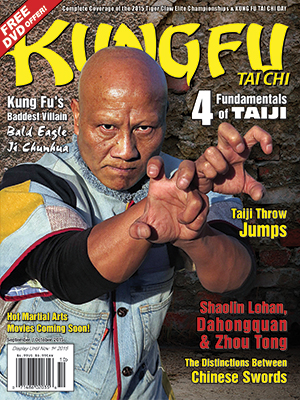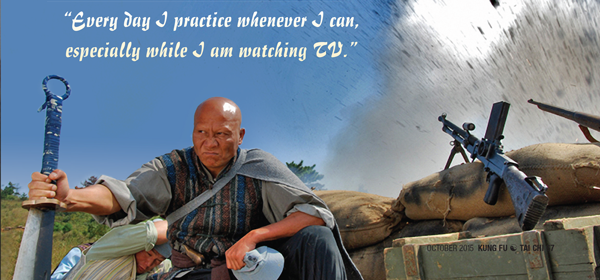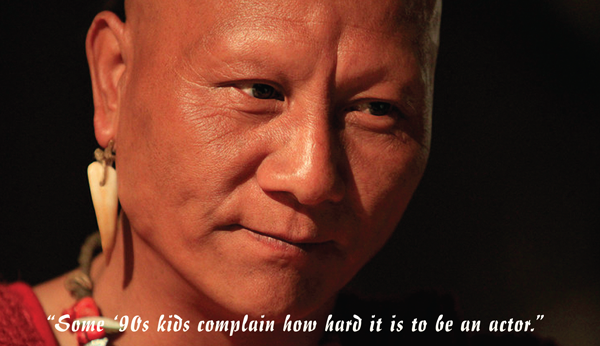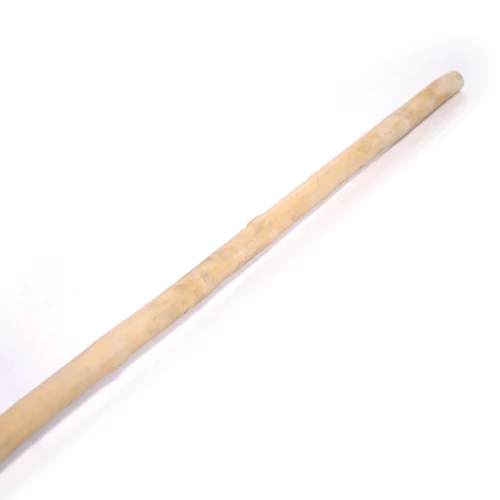By Gigi Oh and Gene Ching
Buy this issue now , or download it from Zinio
 For over three decades, he’s played some of the most memorable Kung Fu villains. Starting with his debut role in the groundbreaking 1982 film Shaolin Temple (少林寺), Master Ji Chunhua (计春华) has played bad guys such as the cold-blooded murderer Royal Liu in Yellow River Fighter (1988黄河大侠), the Poison Juice Monster in The New Legend of Shaolin (1994 洪熙官), the immoral Duan Yanqing in CCTVs Demi-Gods and Semi-Devils (2003天龙八部), and the “main thug” in Empire of Assassins (2011刺客帝國). Ji was cast in Shaolin Temple when he was only 19 years old. Since then, he’s been in over fifty films, including all three installments of the pivotal Shaolin Trilogy. His role in Shaolin Temple earned him the nickname amongst Kung Fu film fans he still carries today – Bald Eagle (Tu Ying 禿鷹).
For over three decades, he’s played some of the most memorable Kung Fu villains. Starting with his debut role in the groundbreaking 1982 film Shaolin Temple (少林寺), Master Ji Chunhua (计春华) has played bad guys such as the cold-blooded murderer Royal Liu in Yellow River Fighter (1988黄河大侠), the Poison Juice Monster in The New Legend of Shaolin (1994 洪熙官), the immoral Duan Yanqing in CCTVs Demi-Gods and Semi-Devils (2003天龙八部), and the “main thug” in Empire of Assassins (2011刺客帝國). Ji was cast in Shaolin Temple when he was only 19 years old. Since then, he’s been in over fifty films, including all three installments of the pivotal Shaolin Trilogy. His role in Shaolin Temple earned him the nickname amongst Kung Fu film fans he still carries today – Bald Eagle (Tu Ying 禿鷹).
Ji’s intense glare and skinhead look give him an appearance both intimidating and fierce, but in person he’s very open and cheerful. He doesn’t get challenged. “People look at me and say, ‘Don’t mess with him. He looks mean.’ Director Tsui Hark (徐克) once told me, ‘You have symmetry and proper facial features. It is your eyes – eyes that cut people like a knife.’ Ji’s rapid-clip Mandarin bears the unique accent of the Southern Yangzi River folk. Ji is very straightforward. He loves to tell jokes and make people laugh. “Most people tell me, ‘You are 100% opposite to the roles you play in the movies.’ It must be true; otherwise, I would be crazy already.” Earlier this year, Publisher Gigi Oh was invited to Master Ji’s home for a gourmet dinner and got to speak to him at length about his remarkable martial arts career. “I am an athlete, not an actor. I love Wushu. For my Wushu dream, I persistently portray a villain.”
“I was skinny and small when I was young. One day my father brought his subordinate, Wang Xingde (王信得), home and told me, ‘Uncle Wang practices Wushu.’ Wang asked me if I would like to learn Wushu. I had no idea of what Wushu was. Wang told me ‘like boxing.’ What boy doesn’t like boxing? I nodded my head. Wang brought me to the Hangzhou Amateur Wushu School to learn Wushu from Peng Liangming (彭良明). Later, I got good enough to be recruited for Zhejiang Province Wushu Team.”
Premature Baldness – a Curse and a Blessing
“Fate might be a good thing can also be bad,” says Ji thoughtfully. “Usually they come together.”
Ji suffered from Alopecia universalis, a condition that causes the rapid loss of all body hair, even the eyebrows. When it happened to young Ji, there were no bald-headed athletes. Baldness was looked down upon. “For about two months, I had this recurring dream every night. A big wok flew over my head. It suddenly turned upside down and dropped to cover me inside. My hair started falling out by the handful. It may be because the Chinese medicine I took for treating my broken fingers was cooked in an aluminum pot and that had some chemical reactions. I don’t know the real reason, but I was definitely under great stress like any other athlete. If you got hurt or had a fever, you still had to persist in training. I was seventeen years old. My dream was to become a professional Wushu athlete. I was a good looking guy. This incident ended my dream. I lost all my confidence with the loss of my hair. I felt ashamed and did not want to go out.”
Ji was forced out of competition, taking an early retirement from the professional Wushu team. He went home to wait for a new job assignment. Wang Xinde asked the bored and depressed Ji to join his Sanda team practice. At the same time, Director Zhang Xinyan (张鑫炎) went to Hangzhou, the capitol city of Zhejiang province, seeking martial talent for Shaolin Temple. Both the Hong Kong and Macao Affairs Office and the National Sports Commission had opened the door for Zhang to handpick the best martial artists for his unprecedented film project. Zhejiang has one of the leading Wushu teams in the nation. Wang Xingde and Peng Liangming were asked to bring their students to audition. Ji was hiding behind other students and did not want to try it out until Zhang spotted him. Zhang watched very carefully and after Ji’s last movement, Zhang shouted out, ‘You are the one!’ That was the birth of Bald Eagle. It launched Ji’s acting career, typecasting him to play villains for the next two decades. The other stars Zhang picked from the Zhejiang team were Hu Jianqiang (胡建强), Chen Guoan (陈国安), and Bian Liqiong (边力强). After Shaolin Temple, many of the cast followed Director Zhang to make Kids from Shaolin (1984 少林小子). The third installment of the Shaolin trilogy, Martial Arts of Shaolin (1986 南北少林), also featured the same ensemble but with Lau Kar-Leung (劉家良) in the director’s chair. "When you meet a certain person, he can change your life. That’s what I have experienced,” says Ji. At nine, he met Wang Xinde, who first introduced him to Wushu. At nineteen, he met Director Zhang Xinyan and started acting. “These two are the people to whom I am most grateful person.”
The Hong Kong film industry labelled martial actors as wuhang (“martial traveler” 武行). For many years, all of the wuhang from Mainland China were under the jurisdiction of the Chinese Wushu Institute (CWI). Their contracts were signed between the CWI and the Hong Kong Sil-Metropole Organization Ltd (香港银都公司). At filming locations, they had to wake at 6 AM, long before the camera would start rolling, and their Wushu coach would train them. There wasn’t much pay. They received a stipend from CWI, but nothing from the Hong Kong film industry.
“In 1985, when Director Zhang told me, ‘You can be a lifelong actor,’ I did not believe it. I did not think I had the look to be one. However, producers and directors came to ask me to join their movie productions. I’ve never had to fight for any roles. Opportunities came to me naturally. This was Zhang’s foresight.” Ji followed Zhang’s advice. It was a major turning point in his life. “I have no regrets. Acting prolonged my Wushu life. Otherwise I would be still in Hangzhou and facing retirement now. Maybe my health would be poor. But most of all, I would have the sense of loss.” So Ji left his job and signed an individual contract with Hong Kong Sil-Metropole. “I had the longest contract of anyone else – 1986 to 1993. I told Zhang, ‘I only have the connection with you not the company. So, if you were not there, I won’t sign the contract.’”
After Ji finished the Zhang-produced film Red Fists (1993少林豪侠传), Jet Li, who also debuted in Shaolin Temple and was part of Zhang’s martial stable of actors, asked for Ji’s help. Jet had started his own film company, Go East Entertainment Production Co. Ltd. (正东制作有限公司). “I did not renew my contract with Sil-Metropole. I was in Jet’s two new films, The Legend of Fong Sai-Yuk (1993 方世玉) and The New Legend of Shaolin. I started entering the China market. I lived in Hong Kong from 1980 to 2000 so people from the Mainland thought I was a native Hong Kong actor. It wasn’t until I worked with Director Yuan Bin (元彬) on the 40-episode TV series Demi-Gods and Semi-Devils that the mainland audiences accepted me.”

Bad Guys Take Hard Falls
The downside of playing the villain is there is a lot of spitting blood and dying. “This one,” says Ji, tapping his left leg, “was broken while filming The Legend of Fong Sai-Yuk, plus the bones of my right knee were shattered. After the surgery, I could not squat down. The Doctor ordered me to rest. Rest hurts, exercise hurts. So I chose an extreme method for healing. I leaned against a wall and squatted down, inch by inch, until my legs felt numb. When it was too painful, I would rest for a couple of days, and then train again. Finally, after three months, my legs were back to normal.”
In the winter of 2010 in Yinchuan, Ji took a more serious injury on the set of Legend of Shaolin Kungfu III: Heroes of the Great Desert (2011 少林寺传奇三). He took a major fall on his neck, leaving him paralyzed. “In almost all of my films I was playing the villain, so I was beaten, often beaten to death. That required me to overexert my neck. The Yinchuan winters are very cold and windy. We were shooting a scene outside the Great Wall. I thought it was only one action scene so I did not do enough warming up. Instead I was resting in a car, waiting for my turn. The close-up shots were completed without any problem. When the long scene started, I told the stunt double, ‘Don’t worry. Just kick my back. I will act accordingly.’ After the first kick, I was supposed to fall in a ditch, crawl uphill, and flee, only to be chased and kicked again. When I received the first kick, my neck was whiplashed. I found myself lying on the bottom of the ditch. My fingers were numb and my body could not feel anything. I looked up and saw all terrified eyes staring at me. I knew something went horribly wrong. All I could say was, ‘Don’t touch me! Who has three insects?’ In the film industry, we customarily burn insects as an offering for God’s blessings. At that moment, I knew there was nothing anyone could do. I turned to God for help. It was the scariest moment in my life.
“I finally regained feeling and could move after a few hours. I finished filming of Legend of Shaolin Kungfu III despite my neck pain. My doctor looked at my X-rays and told me to get surgery right away. But I had promised to take a small role in the TV series All Men Are Brothers (2011新水浒传). I told my doctor, ‘Give me ten days. I will be very careful and have the surgery upon my return.’ When I came back, my doctor examined my new X-ray and asked me if I still felt neck pain. I told him the pain was gone and I felt fine. He said, ‘Your vertebra have re-aligned themselves and your nerves are no longer pinched. Everyone has self-healing ability but it’s a miracle to see you can heal so quickly. Neck surgery is risky. There is a 50/50 chance it could go wrong. I no longer advise you have surgery, but remember, you don’t have a second chance to get hurt again.’
“There are two ways to fight illness. First, let a doctor of physical therapist treat and massage. Second is self-healing. The first one is the passive approach; the second takes initiative. After my neck injury, I tried exercising by holding my legs up close to my chest and rolling on the ground. This exercise also helped my core muscles. In Chinese, huo dong (活动) means activity or exercise. Huo means ‘alive’ and dong means ‘move.’ So to stay alive we must keep moving. I don’t pay much heed to so-called TV health experts. I would rather learn the secret from a healthy person who is over eighty years old.
“Every day I practice whenever I can, especially while I am watching TV. I’m proud that my weight has not changed since I was nineteen. I know how I worked through the past years. It becomes a hobby, or you might say it’s an addiction. When I’m home between films, I get up early and play the stock market. I don’t invest heavy, but I like to keep my brain active. In the afternoon, I exercise, running or bike riding for two or three hours. I love the freedom of riding my bike.”

The Way of the Wuhang
Times have changed for martial artists aspiring to make it in the movies. Nowadays, anyone can post their fight scenes on YouTube, and while there are some excellent shorts out there, few ever get noticed enough to get their big break. Ji may have fallen into movies by sheer luck, but he worked hard at it to stay in it for so many years. “A wuhang needs at least eight years of martial arts training, but acting, well, take me for example. I did not go to a formal acting school. But if you spend double, triple or ten times the effort to practice your role and memorize your lines, you’ll be okay.
“When I first appeared in Shaolin Temple, I couldn’t even say two words. When the director called, ‘Yubei! (get ready 預備),’ and all the crew was staring and laughing at me so I had a hard time concentrating. That was also due to my own lack of self-confidence. Luckily, all the films dubbed our voices. If Jet Li’s voice wasn’t over-dubbed by Tong Zhirong (童自荣), the result would have been different. Film dubbing is a professional field of trained skilled voice actors. Some new wuhang are overconfident; they use their own voices and it backfires. I can act with my body movements, and my eyes can show jingqishen (the three treasures – essence, qi and spirit 精氣神), but my voice is no good, so all of my films use dubbing. I only used my real voice in The Era of Vampires (2003 千年僵尸王) directed by Tsui Hark. He told me that film was only for foreign distribution with English subtitles, so I agreed to use my real voice. But if there was a domestic version, I would have asked to be over-dubbed. I am a southerner, so I have a heavy accent. Even today, if they ask me to do synchronous shooting, I refuse. I am not an artist nor a dramatic actor. I am an athlete. Some people say I act well. I say I am blind in acting but fearless. I tell aspiring wuhang, ‘Don’t be afraid. First, make everyone in front of you disappear. Don’t become entangled when saying the wrong lines. Let it go. It can be dubbed over. Everyone in this circle knows that I like to work as a wuhang. I am in this circle and can communicate with you guys, but my true love is martial arts.’
“I was chatting with Corey Yuan (the director of The Legend of Fong Sai-Yuk 元奎) and he said, ‘Nowadays safety is #1.’ I said, ‘When you directed us in the ‘90s, how come you never kept safety in mind? Just go for it! Do more! Do better!’ He had to admit that the films he did during the ‘90s were the best and most satisfying films. It’s because they combined three positive energies. Yuan said, ‘First, Jet Li himself was the boss. He invested in those films. Second, I had high expectations. I was young and wanted to produce good films to prove my ability. And third, all the wuhang were marching forward together. Everyone was eager to work. “Let me do it! Let me do it!” Adding all of energies together made for an exquisite production. Today, the investors ask for a safer environment, plus older ages, softer hearts, and so on. They find all kinds of excuses to forgive themselves.’ I joked with him, saying, ‘Why did you never mention safety is #1 with us? You pushed me to keep going when I had a cast on my leg!’ Human energy is unlimited. Some people excel under pressure.”
“Some ‘90s kids complain how hard it is to be an actor. Sometimes you have to drink with the director or producer to keep a good relationship. ‘Ganbei! (‘Dry your cup’ 干杯) I will give you this role.’ I tell them, ‘I don’t. I use the time to train myself to be in the top shape all the time. You can drink with the boss, but after gaining weight, how can you look like a knight? He might give you one time chance, but that’s all. Maintaining a 60-year-old body that still can do stunts – there are not many in our industry. It’s up to you to make your decision.’”
From Villain to Good Guy
“I have a new image on screen! In the two different projects I’ve been involved with last year, I was not the villain. I was a good She policeman in Shinning Jian Ou (金瓯), which is a film produced to safeguard public interest and improve social and moral levels [Note: the She people are one of the 56 minority groups officially recognized within China 畲族]. That film is directed by the Chinese Culture and Art Peacekeeping group Tian Qi (田七). The other one was Dragon Locomotive (龙号机), a 30-episode comedy TV series. I’m in the first 10 episodes. The show is about the first locomotive made by Tangshan Railway Vehicle Co., Ltd. It’s directed by Ying Da (英达).
“What might I do in the future? I might edit all my action clips from different stages in my career together – my action footage from the Shaolin Trilogy and all of the others – and watch myself growing from an energetic nineteen-year-old to sixty in slow motion… I’ve never set a target or time frame. As long as there is a need, I’ll keep working. Some people ask me, ‘Why not try to be an action director?’ I tell them if I’m an action director, I will spend most of my time behind the camera yelling, “Yubei! Kaishi! (‘Begin’ or in the case of moviemaking ‘action’ 開始).” I can’t keep myself in shape like that. I am now like a soldier. The boss pays me to train. Many people accompany me with training. How happy it is!”
| Discuss this article online | |
| Kung Fu Tai Chi Magazine September + October 2015 |
Click here for Feature Articles from this issue and others published in
2015 .
Buy this issue now , or download it from Zinio
Written by Gigi Oh and Gene Ching for KUNGFUMAGAZINE.COM
![]() Print Friendly Version of This Article
Print Friendly Version of This Article
















